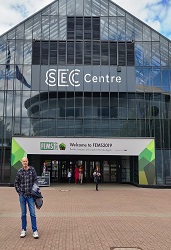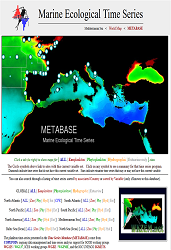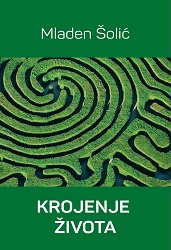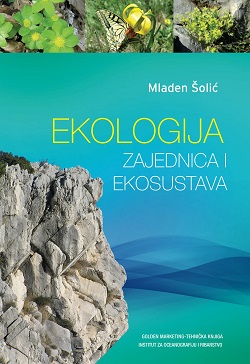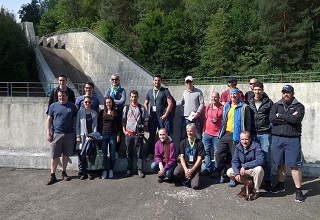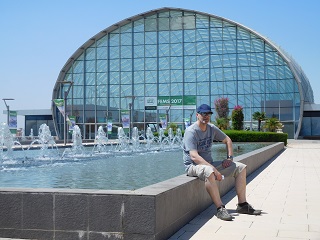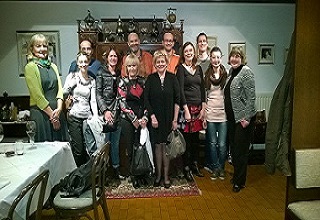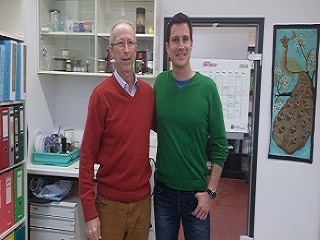News
On-line biblioteka
Knjige "Ekologija morskog bakterioplanktona" (M. Šolić & N. Krstulović); "Mikrobiologija mora" (N. Krstulović & M. Šolić); "Ekologija populacija" (M. Šolić) i "Kvantitativne metode u ekologiji zajednica" (M. Šolić) su od sada dostupne on-line.
FEMS 2019 – 8th Congress of European Microbiologists
Prezentacija pod naslovom “The role of temperature on microbial food web structure in the Adriatic Sea.” izložena je na simpoziju FEMS 2019 (Glasgow 7-11. 7. 2019) kao dio rezultata istraživanja provedenih u okviru MICROGLOB projekta.
Marine Ecological Time Series
As a part of the International Group for Marine Ecological Time Series (IGMETS) of UNESCO, MICROGLOB group participated in Marine Ecological Time Series – METABASA Project with two time-series datasets in the Adriatic Sea (Kaštela Bay and Stončica). https://www.st.nmfs.noaa.gov/copepod/time-series/index-mediterranean-allts.html
Krojenje života
Publicirana je knjiga "Krojenje života" autora Mladena Šolića, koja se bavi odnosom između živog svijeta i neživog okoliša, utjecajem ekoloških faktora na živi svijet, te prilagodbama koje su organizmi razvili kako bi bili uspješni u okolišima u kojma žive.
Ekologija zajednica i ekosustava
Publicirana je knjiga "Ekologija zajednica i ekosustava" autora Mladena Šolića, koja se bavi najsloženijim sustavima ekološke hijerarhije na Zemlji. Knjiga je namijenjna svima onima koji kao predmet izučavanja imaju uzgoj, iskorištavanje/gospodarenje ili zaštitu biljnih i životinjskih zajednica i ekosustava u cjelini. Jednako je tako namijenjena i svima onima koji imaju želju upoznati se s temeljnim ekološkim principima i konceptima koji objašnjavanju funkcioniranje života na Zemlji. U ovu knjigu ugrađena su i najnovija saznanja o strukturi mikrobnih zajednica koja su proizašla iz rada na projektu Microglob.
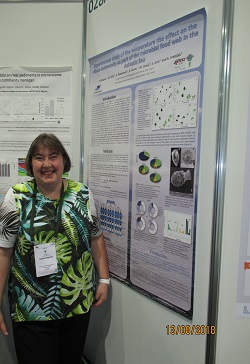
ISME 2018 – 17th International Symposium on Microbial Ecology
Prezentacija pod naslovom „Experimental study of the temperature rise effect on the ciliate community as part of the microbial food web in the Adriatic Sea” izložena je na 17th International Symposium on Microbial Ecology (ISME) (Leipzig, Germany, 12-17 August 2018) kao dio rezultata istraživanja provedenih u okviru MICROGLOB projekta.
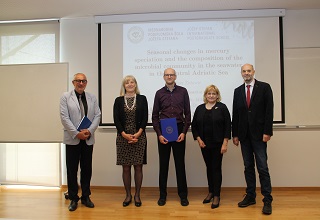
Defence of the Doctoral dissertation
Defence of the Doctoral dissertation of Igor Živković entitled: „Seasonal changes in mercury speciation and the composition of the microbial community in the seawater in the central Adriatic Sea“ at Jožef Stefan International Postgraduate School, Ljubljana, 24 April 2018. The Dissertation is the result of collaboration between the Institute Jožef Stefan, Ljubljana, Slovenia and the Institute of Oceanography and Fisheries (IOF), Split, Croatia. Microbiological parameters were analyzed in the Laboratory of Microbiology (IOF, Split) in the framework of the Research Project MICROGLOB, financially supported by the Croatian Science Foundation (IP-2014-09-4143).
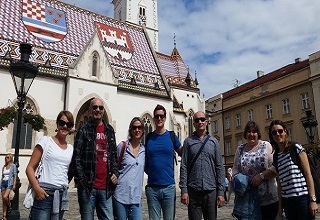
SAME15 – 15th Symposium on Aquatic Microbial Ecology
Suradnici na projektu MICROGLOB sudjelovali su na SAME15 u Zagrebu (3-8. 9. 2017) sa 7 prezentacija. Institut za oceanografiju i ribarstvo bio je suorganizator simpozija, a Mladen Šolić član organizacijskog odbora simpozija i jedan od urednika Knjige Sažetaka.
10th International GAP Meeting
During the period from 19 to 30 August 2017 Danijela Šantić and Ana Vrdoljak stayed in Třeboň (Czech Republic) for participation in the 10th International GAP Meeting (The Group for Aquatic Primary Productivity). They were part of the WG1 working group, which aimed to establish the relationship between algae and bacterial populations in the Římov artificial lake in different environmental conditions.
FEMS 2017 – 7th Congress of European Microbiologists
Prezentacija pod naslovom “Role of temperature increase on bacterial carbon flux towards higher trophic levels in the Adriatic Sea” izložena je na simpoziju FEMS 2017 (Valencija 9-13. 7. 2017) kao dio rezultata istraživanja provedenih u okviru MICROGLOB projekta.
Scientific cooperation with Jožef Stefan Institute (Ljubljana, Slovenia)
Scientific cooperation between scientists from the Jožef Stefan Institute (Ljubljana, Slovenia) and scientists involved in the MICROGLOB project has been established on the issue “The role of microbial community structure on mercury speciation in the open Adriatic Sea”.

IOC-UNESCO REPORT
O’Brien, T.D.1, Lorenzoni, L.2, Isensee, K.3, and Valdés, L.4 (Eds). 2016. What are Marine Ecological Time Series telling us about the ocean? A status report. IOC-UNESCO, IOC Technical Series, No. 129: 296 pp. (available on-line: http://igmets.net/report)
The International Group for Marine Ecological Time Series (IGMETS) of UNESCO, as a result of synergistic activities of the Ocean Carbon and Biogeochemistry Program (OCB), the International Ocean Carbon Coordination Project (IOCCP), and the International Council for the Exploration of the Sea (ICES), identified and compiled the metadata from a large number of ship-based biogeochemical and ecological ocean time‐series that are currently conducting regular measurements. IGMETS analyzed over 340 open ocean and coastal datasets, ranging in duration from five years to greater than 50 years. Their locations are displayed in a world map (Discover Ocean Time Series, http://igmets.net/discover) and in the IGMETS information database (http://igmets.net/metabase). These cross‐time‐series analyses yielded important insights on climate trends occurring both on a global and regional scale. MICROGLOB group participated in this Project with two time-series datasets in the Adriatic Sea (Kaštela Bay and Stončica).
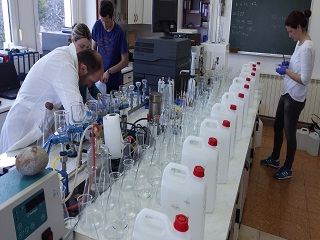
Preparations for setting up the laboratory grazing experiments
Dilution technique is used to estimate instantaneous growth rates of heterotrophic bacteria and autotrophic picoplankton (Prochlorococcus, Synechococcus) as well as their mortality rates caused by heterotrophic nanoflagellate (HNF) and ciliate grazing, and viral lysis.
Visit to the LIMBO Department of the University of Vienna
During May asst. prof. Marin Ordulj form University Department of Marine Studies, University of Split visited prof. Peduzzi form the Department of Bio-Oceanography and Limnology, University of Vienna who is well established expert on the subject of marine and aquatic viruses. The goal of the visit was to widen the undergoing research regarding marine viruses in the MICRGLOB project and establish cooperation between IOF’s Laboratory of Microbiology and LIMBO department.
Festival znanosti 2016 - Tema: „Znanost i Umjetnost“
Laboratorij za mikrobiologiju predstavio se temom „SLIKANJE BAKTERIJAMA“. Nasađivanjem na hranjivu podlogu bakterije se može natjerati da svojim rastom stvaraju slike. Za srca na slici lijevo zaslužna je bakterija Escherichia coli i spretne ruke znanstvenika.
Aerobic Anoxygenic Phototrophs from the Adriatic Sea
Aerobic anoxygenic phototrophs (AAPs) are photoheterotrophic bacteria that require organic substrates for their metabolism and growth, but can derive a portion of their energy requirements harvesting light using bacteriochlorophyll a (BChl a). On the figure, the red dots present mainly AAP bacteria, blue dots are heterotrophs and the green ones are mainly cyanobacteria. AAP bacteria are actively growing part of the microbial community and therefore may play a much more important role in the recycling of organic matter in the ocean than what their abundances alone would predict.
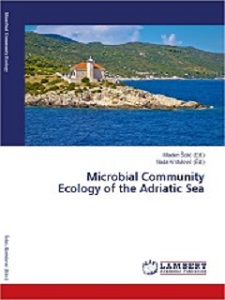
Microbial Community Ecology of the Adriatic Sea (Šolić, Krstulović, Šestanović, Šantić, Bojanić, Ordulj, Jozić)
This book provides an overview of scientific activities of the scientists from Laboratory for Marine Microbiology (Institute of Oceanography and Fisheries in Split, Croatia) and collaborators during the last 15 years, which are presented through the number of case studies performed in different marine habitats of the Adriatic Sea, from the open sea, through the coastal areas, channel waters, enclosed bays, river estuaries, to some special extreme habitats. The main topics of the book are: (1) Microbial community structure which provides an overview of the main components of the microbial community; (2) Microbial food web which is focused on the functional aspect of microbial communities, which includes studying the interactions and the carbon flux through the microbial food web; (3) Extreme habitats which presents the research of microbial communities in the two extreme habitats anchialine caves and eutrophic meromictic saline lake; and (4) the final chapter which is devoted to microbial food web as an indicator of marine environment status in the perspective of Marine Strategy Framework Directive, as one of the most important legal documents of the European Community in the field of marine ecosystems protection.
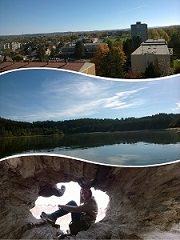
Visit to the University of South Bohemia in České Budějovice (Czech Republic)
Thanks to ERASMUS+ fellowship our PhD student Ana Vrdoljak spent three months in České Budějovice, Czech Republic, on the University of South Bohemia. Namely, she did extraction of DNA from microbial samples and amplified 18S and 16S rRNA genes of protists and bacteria using PCR. Also, she did clone libraries and sequence analysis of these products in order to make phylogenetic tree reconstruction. I learned how to process CARD FISH and how to design probes for FISH. This was a very valuable experience for her because she got an opportunity to work in a very dynamic environment with excellent scientists.
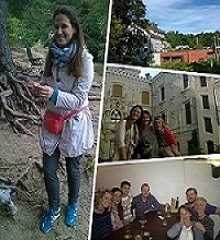
Visit to the Institute of Microbiology of the Academy of Sciences in Trebon (Czech Republic)
Under the supervision of Dr Michal Koblížek we have visited the Department of phototrophic microorganisms of the Czech Republic. During our visit we participated in the field experiment in order to establish a new methodology for the determination of Aerobic Anoxygenic Phototrophs (AAP) in marine environment. We also gained a new knowledge about the molecular techniques such as fluorescence in situ hybridization (FISH) and catalysed reported deposition–fluorescence in situ hybridization (CARD FISH).
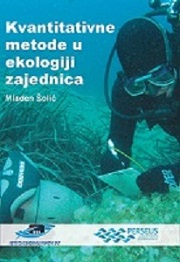
Kvantitativne metode u ekologiji zajednica/Quantitative methods in community ecology (by Mladen Šolić)
Microbial communities play an important role in marine ecosystems through their large contribution to carbon production (up to 90%); assimilation of dissolved organic matter, to sustain their metabolism and produce new biomass; and through the transformation of inorganic compounds into forms suitable for primary producers. This manual was conceived as a guide that provides an overview of quantitative methods that can be used in the analysis of various features of communities, including microbial communities, instructions for using these methods, and gives a theoretical bases of the aforementioned methods, in order to understand which methods are appropriate in particular situation and what are their actual achievements in explaining ecological processes.
Project officially began at 1st November 2015.

